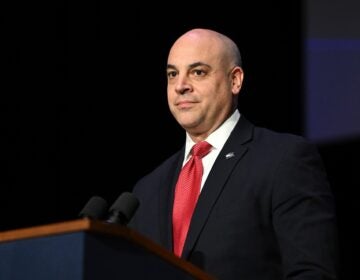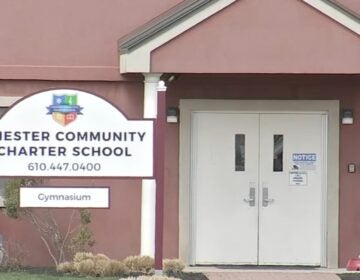A group of 20-somethings in Delco is sparking a ‘public defense renaissance’
With the help of advocates from Partners For Justice, more indigent clients in Delaware County are accessing social services and completing diversion programs at higher rates.
Listen 3:25
Evie Gentile, 23, Sophie Cloarec, 24, and Christina Higashi-Howard, 23, are three of the five Partners For Justice client advocates in the Delaware County Office of the Public Defender. Not pictured are Magdelena Blaise and Gabe Maggio. (Kenny Cooper/WHYY)
From Delco to Chesco and Montco to Bucks, what about life in Philly’s suburbs do you want WHYY News to cover? Let us know!
The criminal legal system is often haunted by unfulfilled reform promises.
But thanks to a determined group of young, aspiring attorneys, a long under-resourced piece of the system in Delaware County is seeing results.
Evie Gentile, 23, a Hershey native, is one of five Partners For Justice client advocates transforming the Delaware County Office of the Public Defender. Because of Gentile and her fellow advocates, more indigent clients are getting access to social services and completing diversion programs at a higher rate than prior years.
Since August 2022, the cohort of PFJ advocates have embedded themselves alongside Delco public defenders, handling a combination of social service and mitigation work.
“A lot of the work that we do is focused on making sure that our clients have what they need to avoid being in a situation where they might have future contact with the criminal legal system. So that looks like helping our clients get into housing or preventing eviction for someone, helping them get into a shelter,” Gentile said.
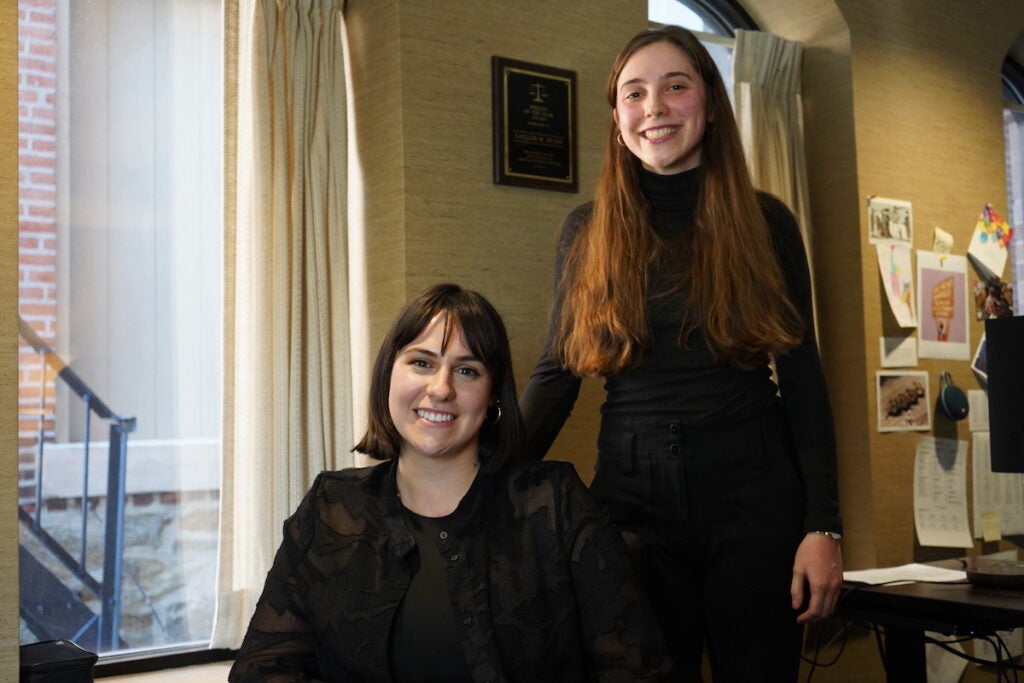
According to PFJ data, the young cohort is getting positive results. To date, PFJ advocates have been assigned to 855 pretrial cases in Delco and an additional 989 cases for people facing probation or parole revocations, a vast majority of which have been for technical violations.
Advocates have accomplished service goal success rates of 65% on housing, 70% on employment, 72% on accessing health care services, which includes substance use and mental health treatment, 62% on family and children related goals, 91% on financial service goals, 83% on goals related to complying with the terms of court cases and about 80% on all other goals.
The overall average service goal success rate is 76.8%.
“I actually don’t know how we existed without them before,” said Chris Welsh, director of the Delco public defender’s office. “It’s hard to underestimate how much of an impact they’ve had for our clients and also for our attorneys.”
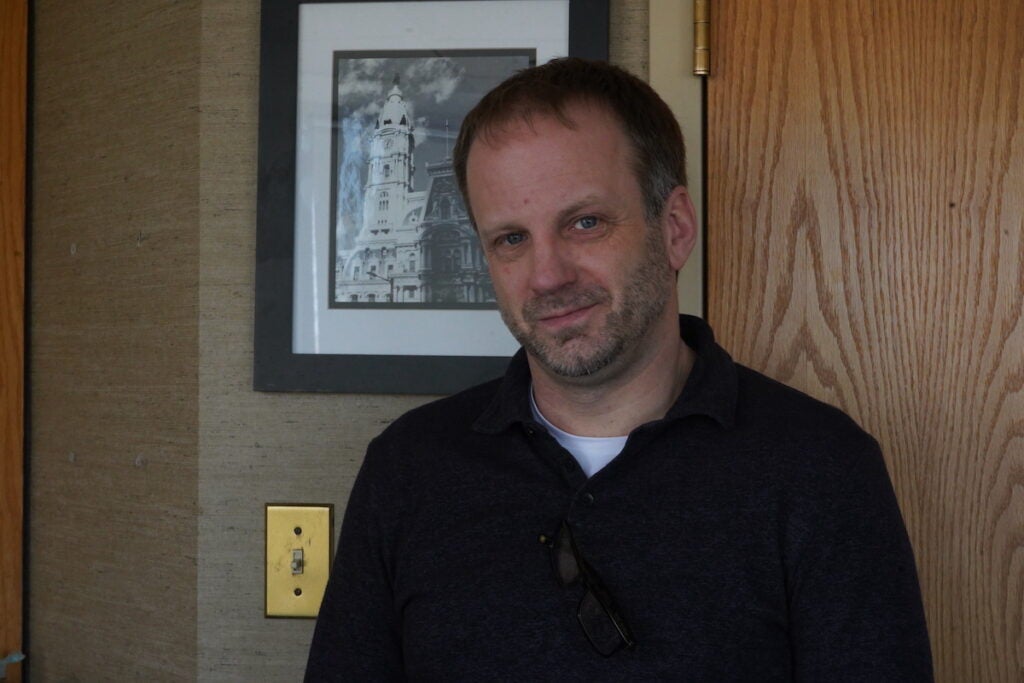
Welsh, whose office underwent a makeover in 2020, said the advocates recruited by the national nonprofit have exceeded expectations.
‘Biggest impact that I’ve seen in my time in county government’
Taylor Dunn, chief of the pretrial division of the Delaware County Office of the Public Defender, manages the day-to-day operations of the PFJ advocates.
“It is astounding to me the amount of work and the quality of work that these advocates are putting out,” Dunn said. “Their passion for the work that we are doing is unmatched and it has resulted in significant positive impacts for my clients on a daily basis.”
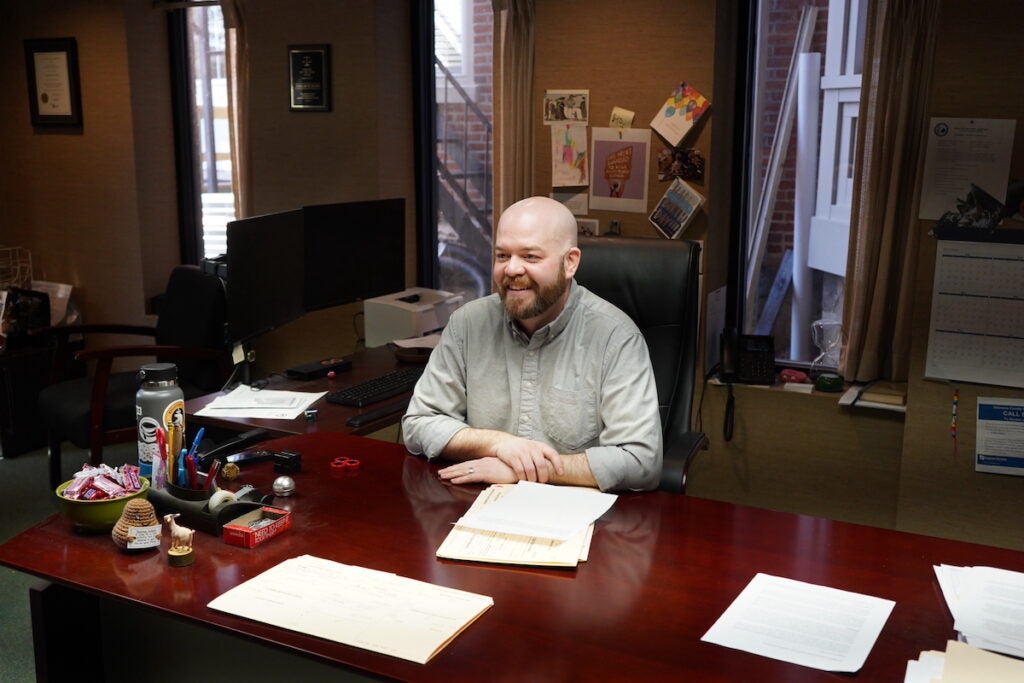
The two measures that he uses to judge their impact is the success rates of two of the county’s diversion programs: the Law Enforcement Treatment Initiative (LETI) and the Delaware County Misdemeanor Diversion Program (DCMD).
Both of these programs run at the district court level and are designed for people charged with low-level offenses.
“All of those diversion programs, which help someone avoid a criminal conviction, all have conditions. They all have things that you have to do in order to achieve that goal at the end — whether it’s drug treatment, whether it’s mental health treatment, whether it’s community service,” Welsh said.
LETI, a creation of Gov. Josh Shapiro, requires people to maintain sobriety for at least 90 days while they receive either inpatient or outpatient treatment. DCMD mandates people complete community services and stay out of trouble.
“The reason I cite these two programs is because they’re the best outcomes I can ask for for a client — because they’re total withdrawals of the cases,” Dunn said.
Clients who cannot afford a lawyer can struggle completing the programs. Oftentimes, the same upstream drivers that make someone more likely to commit a crime, such as poverty, are the same hurdles making it less likely to successfully complete diversion programs.
Prior to PFJ’s arrival in Delaware County, Dunn said the success rate of the LETI program hovered below 35%. Since the advocates began working with clients, that number has increased to near 50%.
Similarly, he said DCMD has seen a “massive improvement.” Success rates have jumped from 50% to 80%.
“It is without a doubt the biggest impact that I’ve seen in my time in county government — where a dollar can be spent and it can have a direct impact on the people most at risk within Delaware County,” Dunn said.
The contract between Delco and PFJ expires this summer. The nonprofit was not intended to be a permanent fixture within a public defender’s office. However, it is meant to serve as proof of concept for municipalities to follow.
“The goal is to renew the contract for two more years,” Welsh said. “And in those two years get training from Partners For Justice in-house about how they do their recruiting and training so that we, at the end of the next two years, can start to do that.”
If Delaware County Council reaches a new contract with PFJ, the public defender’s office would get a new cohort of advocates.
How does PFJ work?
“So much of what we do is about instant rapport building,” said Nathan Orians, assistant public defender with the office. “We walk into a courtroom, this person doesn’t know us and we have to then represent them in something that is hugely important in their personal life.”
The process is quick. Orians said clients do not always trust him. He said the advocates have been “invaluable” to building relationships with clients. They can often talk on his behalf and explain how public defenders can work in their favor.
“As an office, we’re starting to see people from the community come in and trust us initially because in a large part due to the kind of relationship building we can do with these advocates,” Orians said.

The day in the life of a PFJ advocate in Delco can often mirror that of an attorney.
Their work begins when a public defender makes a referral for an advocate. Sometimes, advocates will attend court with their client and an attorney. Other times they will be in the office making calls to help clients obtain vital records such as birth certificates or their license.
Sophie Cloarec, 24, graduated from UC Berkeley in 2021 before returning home to Chester County with dreams of becoming a public defender. Cloarec is part of the PFJ cohort.
Throughout the week, she assists the office with probation hearings with another cohort member, ensuring people are fulfilling their conditions.
”We’ll call every single person on this list if we have their phone number, talk to them about what those conditions are, whether they have an understanding of what’s going on in their probation case and what the barriers are to keep them from completing those, so that we can figure out how to get them off of probation as soon as possible, since they’ve already done their initial sentence,” Cloarec said.
On Fridays, Cloarec says they go to the county courthouse in Media to meet with everyone face-to-face to understand what obstacles are holding them back.
“We try to provide that wrap-around service so that we can get people out of the system and get them moving on to do bigger and better things and not have to continue to report to probation and have that as something that’s holding them back,” Cloarec said.
There are even days where the advocates travel to the George W. Hill Correctional Facility to speak with clients about their needs and to prepare mitigation reports to share with the judge and the District Attorney’s Office.
Devon Potts, an assistant public defender in Delco’s office, said PFJ has helped manage her caseload through the drafting of those reports. The written reports, which are given to a judge and/or the prosecutor, serve as a snapshot of a client’s life story.
The advocates have taken over some of this work on behalf of the public defenders.
“I’ve had clients who literally have had multiple charges dismissed because those mitigation reports allow the district attorney in the court to see our clients in a light that they don’t see them in,” Potts said.
Gentile said writing those reports is one of the most rewarding parts about her job.
“I feel like it’s a really concrete way to be able to talk to our clients about their stories and their experiences and share them with the court to emphasize their humanity and everything that they’ve been through that has gotten them to that point in their lives,” she said.
Dunn said the county’s investment into PFJ has been key to keeping people out of jail.
“In a situation where you lose one, two or three days in jail,” Dunn said. “It’s massive for them. Their entire world could fall apart for three days in jail and having an advocate be able to track down a verifiable address so that someone is not stuck languishing in jail because we can’t confirm where they’re going to live is massive.”
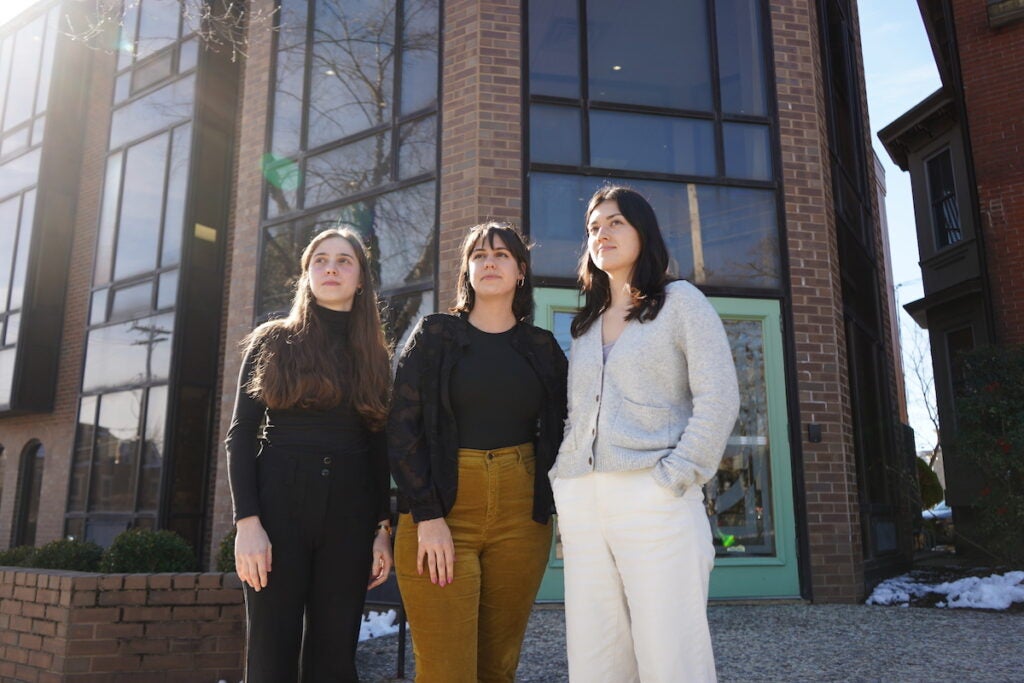
PFJ founder: Public defenders are ‘not the Joker’
Emily Galvin-Almanza, co-founder and co-executive director of PFJ, said its entry into Delaware County was driven by a group of elected leaders who saw the value in improving public safety, increasing services and slashing recidivism.
She said public defenders have been treated like “the Joker” while law enforcement receives the praise of Batman.
“The truth is we’re not the Joker,” Galvin-Almanza said. “The truth is defenders have upstream confidential access to a group of folks who are struggling and when you are trying to prevent future harm and make people able to engage fruitfully in their environment without engaging in any form of misconduct it’s hard to mandate the level of care that’s necessary to help people succeed.”
As of 2024, PFJ will be serving 20 states by the end of the year.
“This little region of Delaware, Delaware County, Philly — it’s been really instrumental in sort of spurring change and modeling the most cutting edge public defense practices,” Galvin-Almanza said.
PFJ’s expansion across the country — and more recently into Philadelphia — has been fueled by success stories from the region.
“We’re going to be serving Cumberland County later this year,” Galvin-Almanza said. “It’s kind of a public defense renaissance moment in Pennsylvania where there’s so much more realization of what public defenders are capable of and also how important they are in the safety conversation — that public defenders can do more to lower recidivism sometimes more than any other actor in the legal system.”

Get daily updates from WHYY News!
WHYY is your source for fact-based, in-depth journalism and information. As a nonprofit organization, we rely on financial support from readers like you. Please give today.





